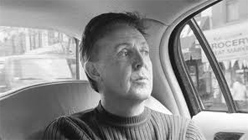Who is Paul McCartney, really? Is he the person who George Harrison once said was a “selfish” Beatle fixated on his own accomplishments? Is he, in the words of Howard Stern, “a saint” — someone whose music is “so goddamn uplifting” that he’s unlike any other living musician? Or is he somewhere in-between these polarities of selfishness and sainthood? The Love We Make seems to solve that question, and the credit goes mostly to director Albert Maysles and his filmmaking partner, Bradley Kaplan, who show that McCartney — in old age — has come to terms with his own rough edges.
McCartney is 69. The Love We Make, which opens tonight (Friday, December 16, 2011) at the Roxie Theater, follows McCartney in the weeks after 9/11, when he is planning and pulling off a fundraising concert for New York City. McCartney walks the streets of Manhattan, where he’s subsumed by strangers who ask for his autograph. He meets with musicians he’s asked to perform on the same Madison Square Garden stage. And he speaks with celebrity interviewers like Barbara Walters and Dan Rather, who pepper him with questions about the Beatles, and about where he was when 9/11 happened (on a plane at a New York City airport, on the tarmac preparing to fly to England). McCartney hand-picked Maysles to make this behind-the-scenes documentary, but he gave Maysles carte-blanche to film whatever he wanted. He trusted Maysles — McCartney had known him since 1964, when Maysles made a film about the Beatles’ first visit to America — and Maysles doesn’t disappoint.
Maysles, who is 85, lives by the credo, “Show, don’t tell.” Every one of his films, including Gimme Shelter, the 1970 documentary about the Rolling Stones that he shot with his brother David, lets the documented events tell a bigger story. There’s no voice-over narration. No “theme music” that anchors scenes. No extra anything except the credits and a you-are-there approach that makes viewers feel like they’re active witnesses, almost participants, really, in the dramas that unfold before them. Maysles is the antithesis of a filmmaker like Michael Moore.
“Michael Moore is out to get people. I’m out to understand them simply by filming what’s going on, and letting people judge for themselves,” says Maysles in a phone interview from New York. “What I’m always trying to do is to humanize through the process of empathizing with the people I’m filming. My mother used to say, ‘There’s good in anybody.’ And I’m always looking for that in my films.”


